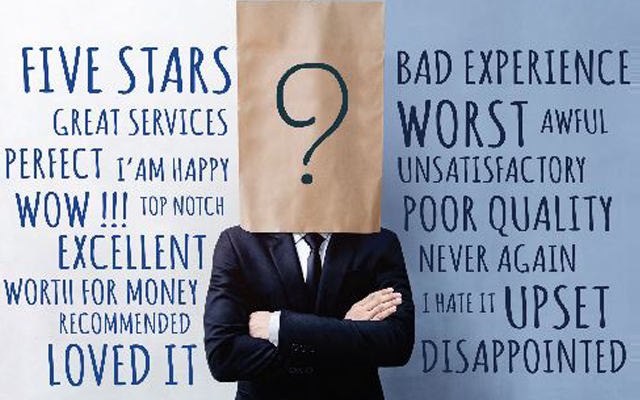Gwendoline Davies, head of commercial dispute resolution and retail specialist at law firm Walker Morris LLP, discusses the dangers of fake online reviews and explains how retailers can protect their brand and their credibility…
Fake reviews have featured in the press a lot recently, but they are certainly not a new phenomenon and such practices have no doubt existed for as long as people have been reviewing products and services. However, the explosion of the online retail marketplace has made fake reviews a very lucrative business. At present it can be difficult for businesses to identify, prevent and respond effectively to fake reviews. However, a recent landmark case saw an Italian court sentence a man to prison for ‘paid review fraud’ (the act of selling fake reviews to businesses). This is the first case of its kind.
Effect on the marketplace
On selling platforms (such as Amazon, for example) and review platforms (such as TripAdvisor), the number of positive reviews a seller has directly affects its prominence in searches, and a seller with a higher rating is likely to sell more. In addition, consumers have become increasingly reliant on user-reviews and the weight given to such reviews when deciding whether to make a purchase is often greater than that of traditional advertising. In 2015 the Competition and Markets Authority published figures that 54% of UK adults use online reviews and £23 billion per year of UK spending is potentially influenced by online reviews[1] and the figures will, no doubt, have increased since then. This trend in buyer behaviour has opened the door for those looking to exploit the online marketplace by selling favourable reviews. This process is known as ‘review brushing’ and appears to be thriving. ‘Brushers’ are people hired to provide positive feedback in order to boost the vendor up the rankings in online searches, leading to increased sales.
The case noted earlier involved review brushing and was recently considered by the Italian courts. TripAdvisor brought a claim against PromoSalento, a digital marketing agency which was known to specialise in selling ‘review packages’ in the hospitality industry. PromoSalento charged 100 euros for 10 reviews and offered discounts for buying in bulk. The landmark ruling of the Italian courts saw the man behind PromoSalento jailed for nine months and ordered to pay €8,000 in costs and damages. In reaching its decision, the court identified a provision in the Italian Constitution which established that writing fake reviews under fake profiles is a criminal offence.
On the other side of the coin, fake negative reviews can be devastating – especially for small businesses. For example, in America, a newlywed couple undertook a campaign of fake negative reviews in respect of their wedding photographer, who was forced to close down his business as a result.
Apart from review brushing and the posting of fake reviews, the marketplace is also increasingly experiencing indirect unscrupulous practices, including sellers offering free goods in return for positive reviews; sellers insisting that a refund to a consumer is conditional on the consumer providing a high or five-star rating; or sellers refusing to provide refunds where consumers have posted honest but unfavourable reviews.
How can responsible retailers protect themselves?
One tip for spotting fake reviews is to read the reviews carefully. Typically, companies who provide fake review services use several writers for the task, so the first few reviews may appear genuine. However, as more reviews come in, patterns may emerge. A careful analysis of reviews may reveal similarities in style and language which indicate that the reviews came from the same source and are therefore not genuine. As well as this type of ‘manual’ analysis, specialist software/tools can screen reviews against various data points (including language, date, image, etc) to automatically identify and remove fakes; plus, wherever reviewers have profile pictures of any kind, reverse image searching across the internet can detect those ‘people’ or accounts who post repeated reviews.
The consumer group Which? has recently published the following advice on how to spot a fake review[2]:
- Do not rely on ratings alone. Delve deeper and read the reviews.
- Check the dates. If many reviews were posted in a short time period, it might mean there was a deliberate push for them, which may or may not have been legitimate.
- Critically assess impartiality. Click to research reviewers and their history. Do they give everything five stars?
- Look at the pattern of ratings. If the ratings are at different ends of the scale with very little in between, that could be suspect, as it is rare that people are completely polarised about a product. Similarly, if some reviews highly praise an aspect of a product that others have criticised, that could be a red flag.
How can UK retailers take action?
Broadly there are two practical ways in which retailers can deal with fake reviews: some businesses respond to reviews directly (which might involve reasonably answering/addressing untrue or unreasonable reviews and/or asking for the review to be removed); whilst others hire marketing firms to help them do so. Marketing firms might also respond to reviews and/or they might apply wider strategies for improving a business’ image and ratings. Any responsible retailer using a marketing firm should ensure that those strategies do not involve review brushing, as that could result in liability, not to mention potential reputational damage, for the retailer itself.
Another important practical tip, especially for smaller retailers, is to ensure that your customer service is excellent at all times. Dealing positively and effectively with issues or complaints can help to minimise the potential for disgruntled customers airing their grievances online.
There are, however, also a number of legal options and grounds under which a retailer and/or a consumer may take legal action in respect of fake reviews depending upon the specific circumstances:
- The Consumer Protection from Unfair Trading Regulations 2008 (CPRs): a number of unfair commercial practices are excluded under the CPRs, including misleading consumers into buying a product.
- Business Protection from Misleading Marketing Regulations 2008 (BPRs): this legislation includes, among other things, a general prohibition on misleading advertising. False reviews which are made in order to promote the sale of a product could be considered advertising and could therefore fall within the ambit of the BPRs.
- Defamation: although a retailer may have no legal recourse against a genuine review which makes it look bad, the tort of defamation can be used to take action against unfounded reviews which damage a business or its reputation.
- Misrepresentation: a misrepresentation is an untrue statement which induces a party to enter into a contract. If when purchasing goods or services a party has relied on a fake review which has been solicited by the retailer, then this may be actionable.
- Fraud: where a claimant is able to actually prove the dishonest intentions of the person posting (or, potentially, inciting) the fake review, then it may be able to pursue a charge of fraud by false representation under section 2 of the Fraud Act 2006, which could be pursued by a referral to the police (Action Fraud) or the SFO (if sufficiently serious) or a private prosecution.
- Providing fake reviews can also constitute a criminal offence under various other statutory provisions[3] and can be punishable by a fine and/or varying lengths of imprisonment depending upon how the offence is classified.
As the incidence and ingenuity of online review manipulation increases, and in an already highly competitive retail market, it is essential that retailers do all they can to protect their brand and the credibility of their products and their online presence. Responding quickly and effectively to fake reviews, in whatever form they may appear, can form an important part of that.
[1] https://assets.publishing.service.gov.uk/government/uploads/system/uploads/attachment_data/file/436238/Online_reviews_and_endorsements.pdf
[2] https://www.which.co.uk/news/2018/10/the-facts-about-fake-reviews/ and https://www.which.co.uk/consumer-rights/advice/how-to-spot-a-fake-review
[3] under various potentially relevant legislation (such as Consumer Protection Act 1987, Trade Descriptions Act 1968, Food Safety Act 1990, Financial Services Act 1986, Trade Marks Act 1994, for example
















